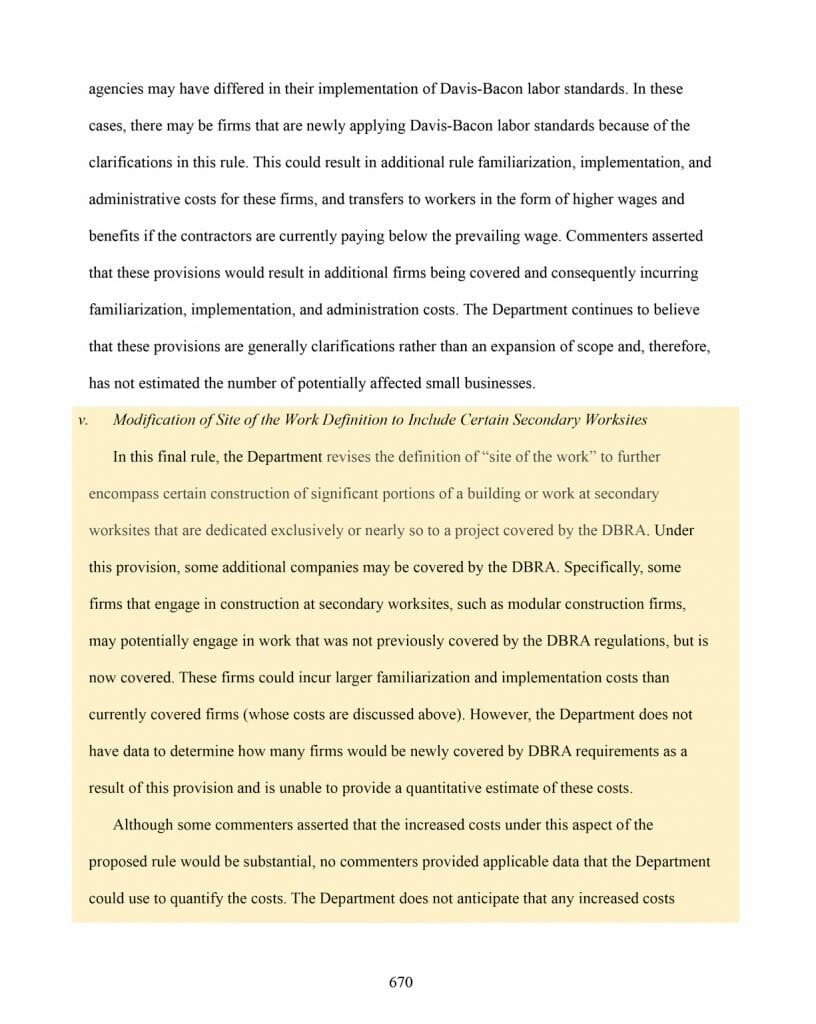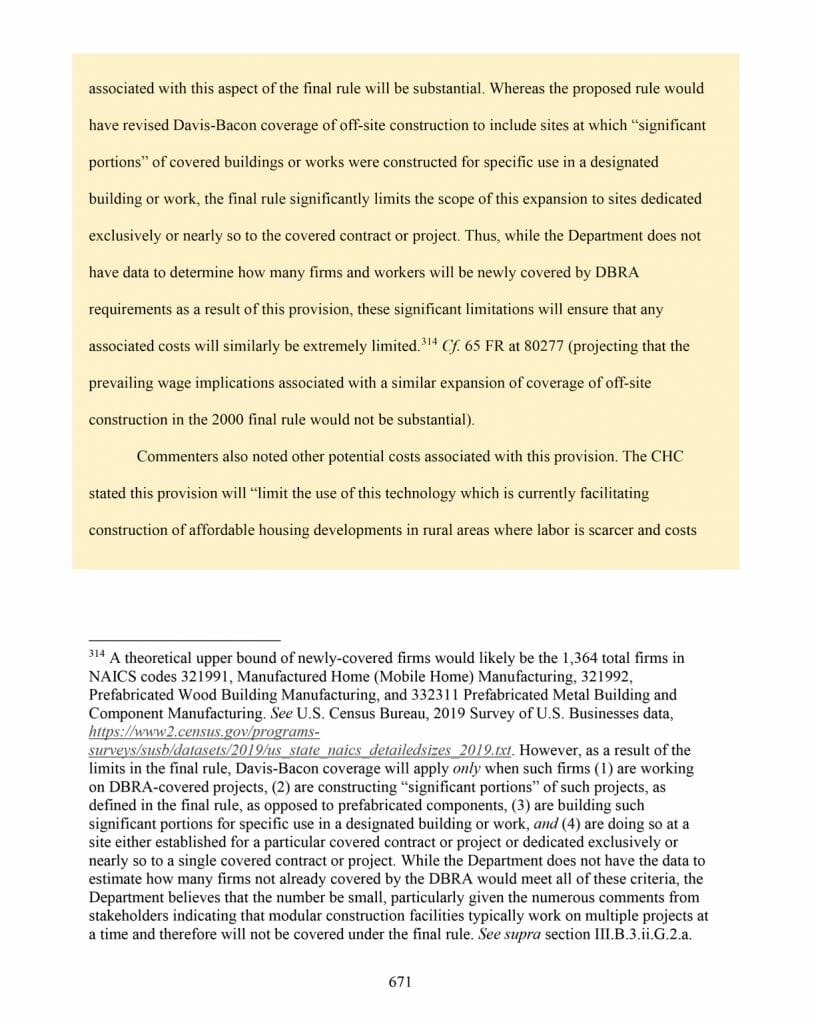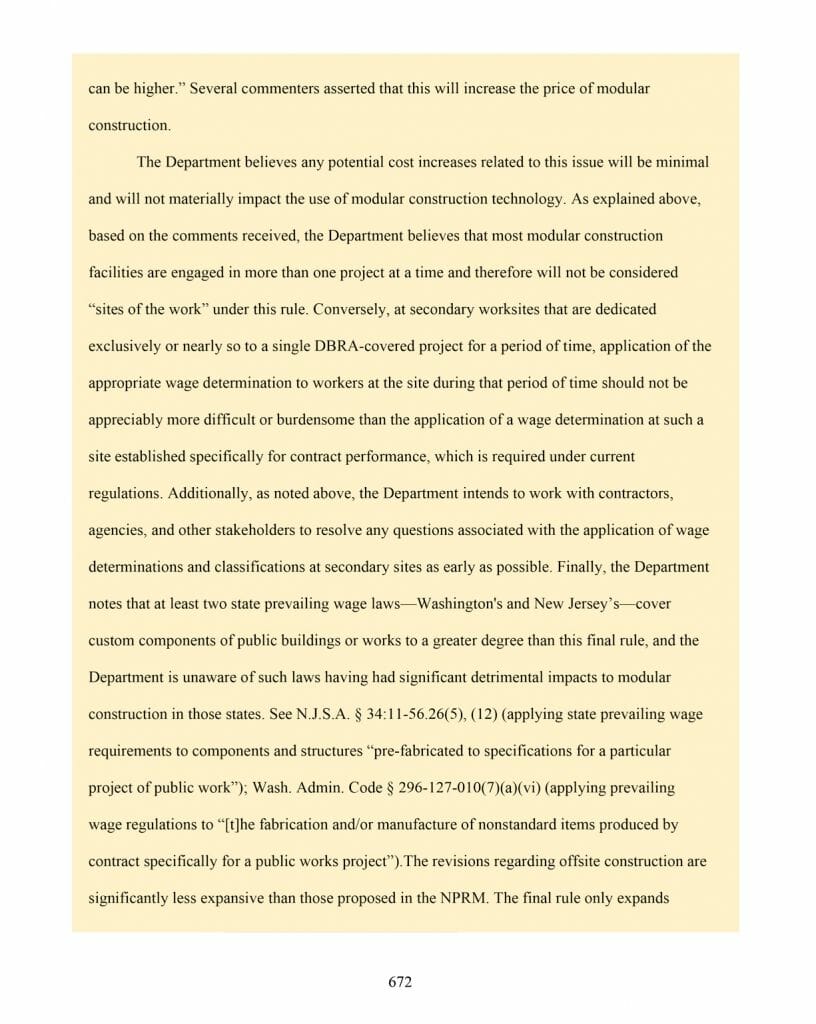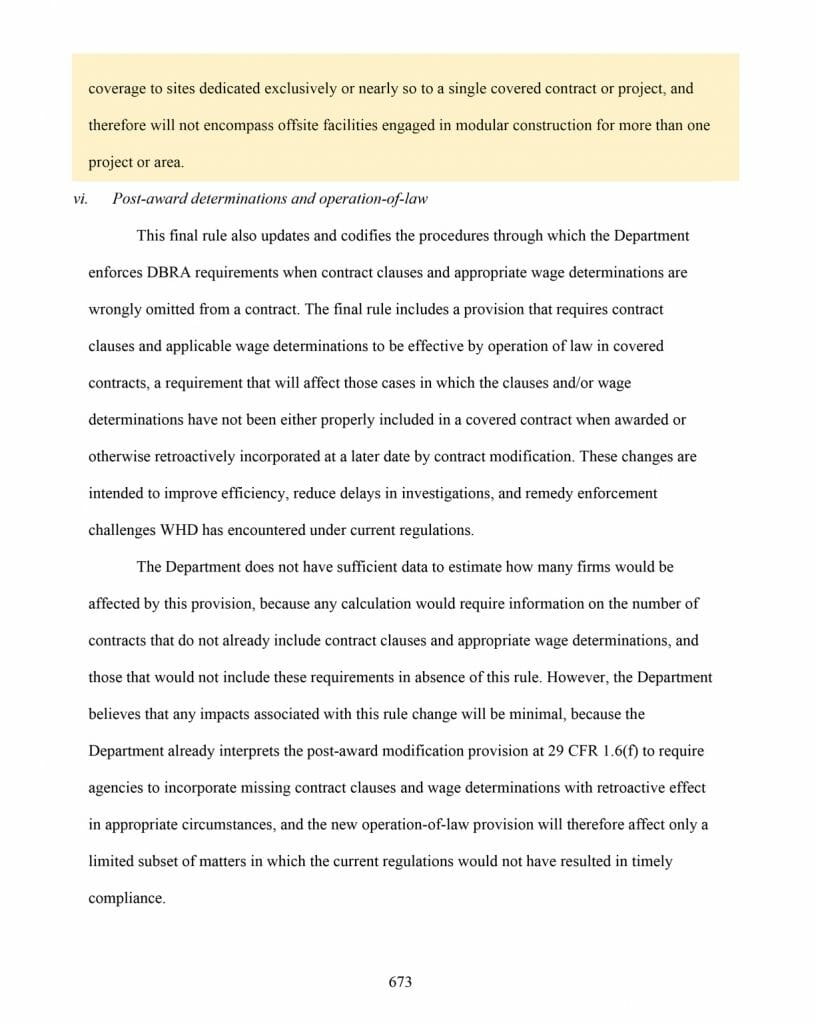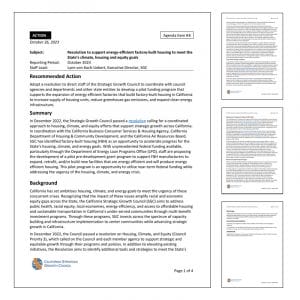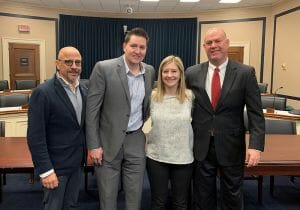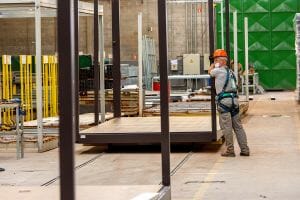Modular Building Institute Defeats Davis-Bacon Act Expansion
U.S. Department of Labor Published Final Davis Bacon Act Rules: MBI Successful in Preventing Expansion into Offsite Construction
On August 8, 2023, the US Department of Labor (DOL) published its final rule revising and expanding the Davis-Bacon Act. As proposed, the Act would have been expanded to include “secondary sites” such as modular factories on federally-funded projects. However, after an extensive year-and-a-half long lobbying effort by the Modular Building Institute (MBI) and its members, the DOL published the final rule today WITHOUT the proposed expansion to the modular building industry!
MBI members expressed numerous concerns over the rule including its legality, its impact on small business and its inflationary impact on housing. Additionally, a big concern for the industry were the 26 states with so-called “Little Davis Bacon” Acts (state-level laws that mirror the Davis-Bacon Acts requirements) that would have likely adopted the federal government’s reinterpretation, thus eliminating all state-funded projects from consideration as well.
MBI members submitted dozens of written comments opposing the expansion during the proposed rule phase. Members also participated in calls with the Office on Information and Regulatory Affairs (OIRA) to express their concerns. Additionally, MBI Executive Director Tom Hardiman, Jim Gabriel of member company MODLOGIQ and Alan Rasmussen of member company Modern Building Systems went to Washington DC to personally share their testimony of the negative impacts of this rule with key Congressional staffers.
“We had a fantastic team in place,” said MBI’s Board President, Chuck Walen of Satellite Shelters. “We had one of the nation’s top labor law firms in our corner, allies on Capitol Hill, supporters in the affordable housing sector, and most importantly, the support of our members.”
It is important to note that MBI was specifically mentioned eight times in the final rule, while members including Blazer Industries, Phoenix Modular Elevator, Southeast Modular, Modular Solutions, Ltd., Cloud Apartments, Quartz Properties, and many others were also specially cited.
“It’s great to see that the Department of Labor heard the voice of MBI and our membership," said Jon Hannah-Spacagna, MBI's government affairs director. "This will allow the partnerships our industry has established with government agencies to support affordable housing and government projects to continue to grow.”
“In my twenty years with MBI, this is by far the biggest win for our industry,” said MBI executive director Tom Hardiman. “MBI and our members were able to delay this rule’s implementation for over a year and ultimately prevailed in getting the anti-industry language removed.”
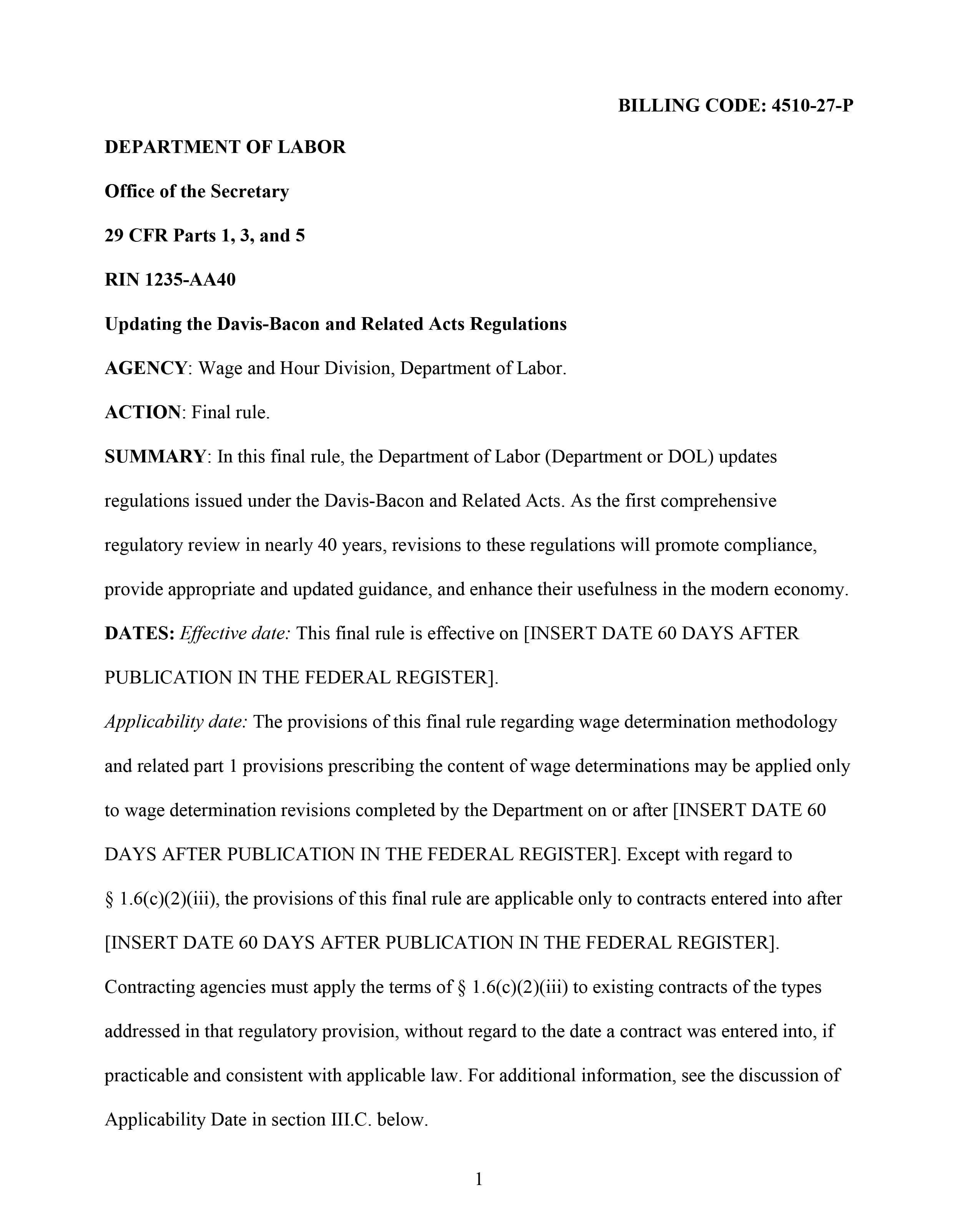
The complete text of the U.S. Department of Labor's expansion of the Davis-Bacon Act is available for download here. Pages 670-673 (shown below) detail the modular construction industry's exclusion from this expansion.
How This Ruling Affects the Modular Construction Industry
Due to the feedback from MBI and its members, the U.S. Department of Labor's newly-published rule has been changed from its proposed form to exclude offsite construction facilities that are not built specifically built for a particular project. The language highlighted below details the scope of the expanded Act to the modular construction industry.
Pages 670-673 of the U.S. Department of Labor's final ruling on the Davis-Bacon Act expansion.
A Victory for the Modular Construction Industry
These changes to the final published rule represents a tremendous victory for the modular construction industry. Without the support of MBI members in the form of written and in-person feedback, fundraising, travel, and direct donations to MBI's regulatory relief fund, MBI would not have been successful.
In particular, the testimony from the following MBI members was critical in helping communicate the industry's opposition to the proposed rules:
- Jim Gabriel, MODLOGIQ
- Ralph Tavares, R&S Tavares Associates
- John Buongiorno, Axis Construction Corp.
- Amin Irving, Ginosko Development Company
- Brad Gudeman, Modular Genius
- Vaughn Buckley, Volumetric Building Companies, Inc.
- Matt Slataper, Ramtech Building Systems, Inc.
- Bostjan Jevsek, Piva Group, S.p.A.
- Mike Wilmot, Wilmot Modular Structures
- Stephen Shang, Falcon Structures
- Alan Rasmussen, Modern Building Systems
This victory is also a credit to the U.S. Department of Labor, who took the time to understand the potential impacts to MBI member companies and the greater needs of the country to which the industry can contribute.
Implications for the Industry
While this victory is huge on its own, the implications of the clarifications in this rule are even more beneficial to the industry. Stay tuned to MBI for additional messaging on these great opportunities.
More Information
Click the links to find answers to frequently asked questions, overview of the changes and Davis-Bacon Act Comparison charts.
Thank you as always for your ongoing support of the association and the modular construction industry.
Additional Government Affairs Articles
ICC/MBI Standards 1200 & 1205 Provide Foundation for Utah’s First-Ever State Modular Program
Utah becomes the second state in the country, following Virginia, to fully adopt ICC/MBI standards 1200 and 1205. MBI will continue to work with leadership in Utah to implement the new program.
Read Complete ArticleBuilding at the Intersection of Housing Affordability & Energy Conversation
Tasked with looking at how the state of California can best house its growing population while meeting its aggressive energy, housing, transportation, land use, and equity goals, the California Strategic Growth Council (SGC) faces a slew of challenges. But, if the outlook of SGC Executive Director Lynn von Koch-Liebert is any indication, it’s only a matter of time before those challenges are successfully met.
Read Complete ArticleMBI Delegation Briefs Congressional Staff on the Negative Impacts of the Davis-Bacon Act Expansion
On a recent call with the White House’s Office of Information and Regulatory Affairs (OIRA), several MBI members provided testimony about the potential impact expanding the Davis-Bacon Act would have on their company and the industry.
Read Complete ArticleMBI Members Provide Testimony to White House Regarding Concerns of Davis-Bacon Act Expansion
On a recent call with the White House’s Office of Information and Regulatory Affairs (OIRA), several MBI members provided testimony about the potential impact expanding the Davis-Bacon Act would have on their company and the industry.
Read Complete Article
